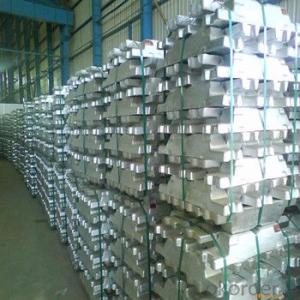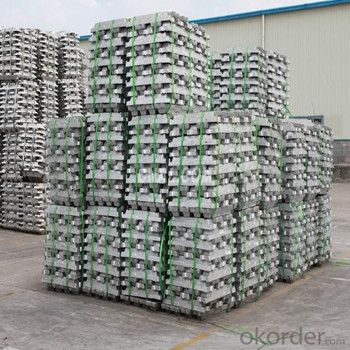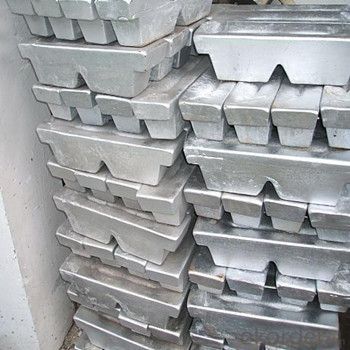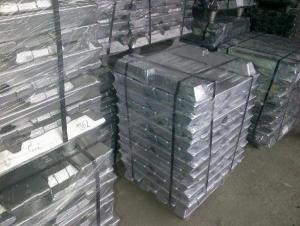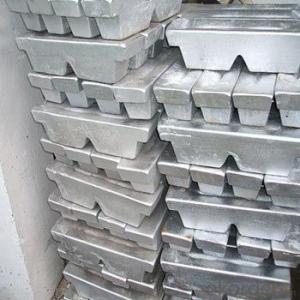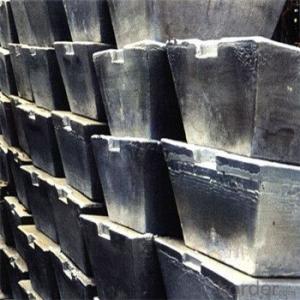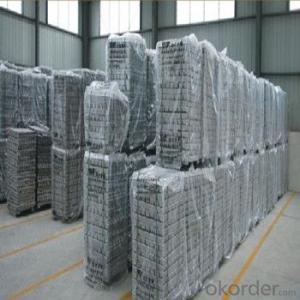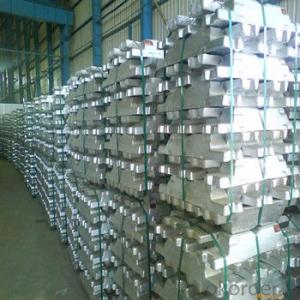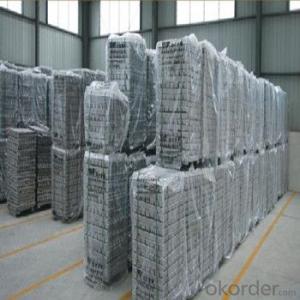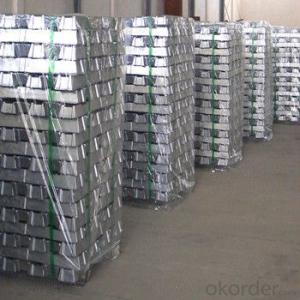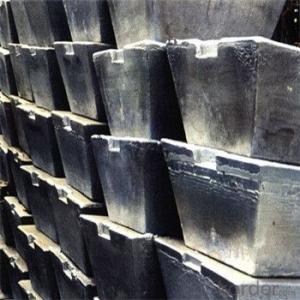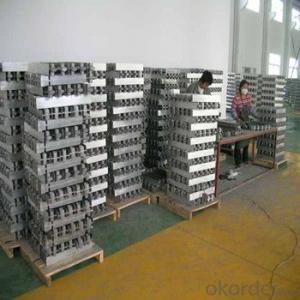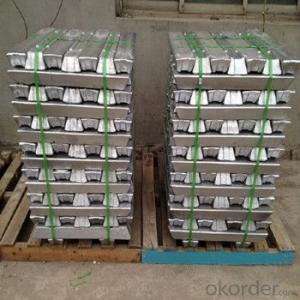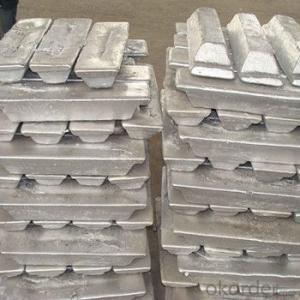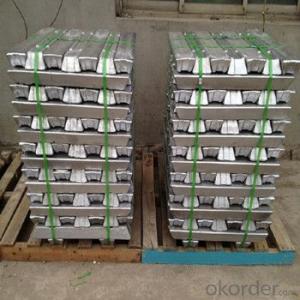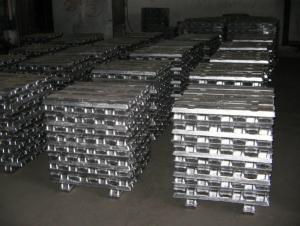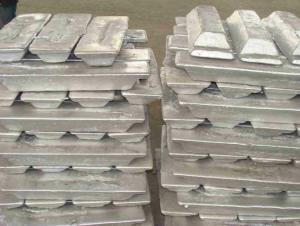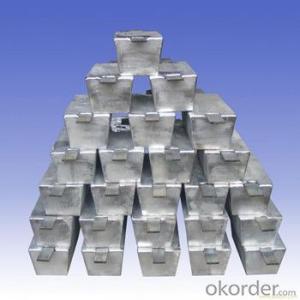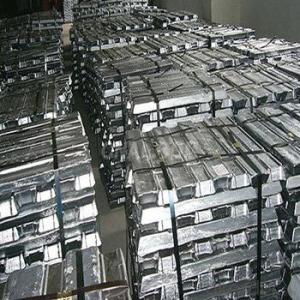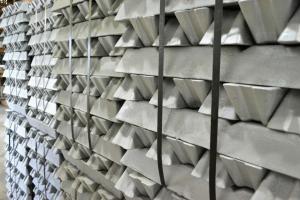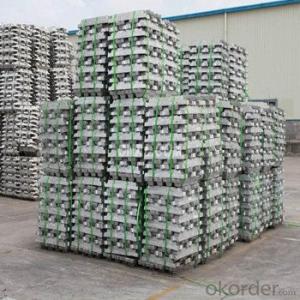Aluminium Ingots with High 99.99% Purity and Competitive Price
- Loading Port:
- China main port
- Payment Terms:
- TT OR LC
- Min Order Qty:
- 1000 m.t.
- Supply Capability:
- 10000 m.t./month
OKorder Service Pledge
OKorder Financial Service
You Might Also Like
Pure Aluminum Ingot Used for Industry
1.Structure of Aluminum Ingot Description
Aluminum Ingot is with the AL as the main chemical composition. Aluminum Ingot is used for industry,such as automobile,pinning and weaving,electron broadly and so on. Aluminum Ingot has the following advantages: easy control and operation, fast melting.
2.Main Features of the Aluminum Ingot
•High Purity
•Easy control and operation
•High strength
•Fast melting
•Competitive price
•Best Service
3. Aluminum Ingot Images
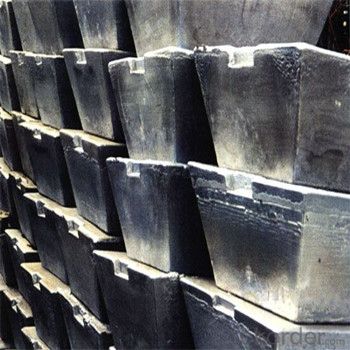
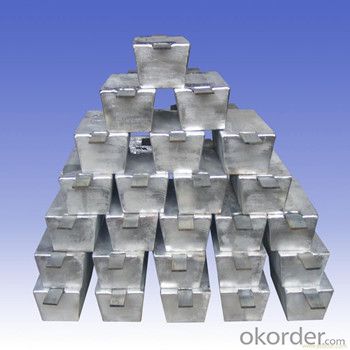
4. Aluminum Ingot Specification
Grade | Chemical Composition % | |||||||||
Al≥ | impurities ≤ | |||||||||
Si | Fe | Cu | Ga | Mg | Zn | Mn | others | Sum | ||
Al99.9 | 99.90 | 0.50 | 0.07 | 0.005 | 0.02 | 0.01 | 0.025 | - | 0.010 | 0.10 |
Al99.85 | 99.85 | 0.80 | 0.12 | 0.005 | 0.03 | 0.02 | 0.030 | - | 0.015 | 0.15 |
Al99.7 | 99.70 | 0.10 | 0.20 | 0.010 | 0.03 | 0.02 | 0.030 | - | 0.030 | 0.30 |
Al99.6 | 99.60 | 0.16 | 0.25 | 0.010 | 0.03 | 0.03 | 0.030 | - | 0.030 | 0.40 |
Al99.5 | 99.50 | 0.22 | 0.30 | 0.020 | 0.03 | 0.05 | 0.050 | - | 0.030 | 0.50 |
Al99.00 | 99.00 | 0.42 | 0.50 | 0.020 | 0.03 | 0.05 | 0.050 | - | 0.050 | 1.00 |
5.FAQ of Aluminum Ingot
We have organized several common questions for our clients,may help you sincerely:
①How about your company?
A world class manufacturer & supplier of castings forging in carbon steel and alloy steel,is one of the large-scale professional investment casting production bases in China,consisting of both casting foundry forging and machining factory. Annually more than 8000 tons Precision casting and forging parts are exported to markets in Europe,America and Japan. OEM casting and forging service available according to customer’s requirements.
②How to guarantee the quality of the products?
We have established the international advanced quality management system,every link from raw material to final product we have strict quality test;We resolutely put an end to unqualified products flowing into the market. At the same time, we will provide necessary follow-up service assurance.
③How long can we receive the product after purchase?
In the purchase of product within three working days, We will arrange the factory delivery as soon as possible. The pecific time of receiving is related to the state and position of customers.Commonly 7 to 10 working days can be served.
- Q: What is the tensile strength of aluminum ingots?
- The specific alloy and manufacturing process employed can cause variations in the tensile strength of aluminum ingots. On average, the tensile strength of these ingots falls within the range of 70 to 700 megapascals (MPa). It is crucial to consider that factors like the purity level, presence of impurities, and the heat treatment process can influence the tensile strength. Moreover, different aluminum alloys exhibit distinct tensile strengths, necessitating the specification of the alloy in order to determine the tensile strength of aluminum ingots accurately.
- Q: How are aluminum ingots used in the production of modular buildings?
- Aluminum ingots are used in the production of modular buildings as they are melted and formed into various structural components such as beams, columns, and panels. These ingots are particularly beneficial due to their lightweight yet strong nature, making them ideal for constructing durable and easily transportable modular buildings. Additionally, aluminum's resistance to corrosion ensures the longevity and low maintenance of the structures.
- Q: Brief introduction of die casting aluminium ingot
- Aluminum, our daily industrial raw materials called aluminum ingot, according to the national standard (GB/T1196-93) should be called "remelting with aluminum ingot", but we are used to "aluminum ingot"". It is with the alumina cryolite produced by electrolysis.
- Q: What are the different recycling methods for aluminum ingots?
- Aluminum ingots can be recycled through several methods, each with their own advantages and applications. One commonly used method is mechanical recycling, also known as shredding and melting. This process involves shredding the aluminum ingots into small pieces and then melting them in a furnace. The molten aluminum is then cast into new ingots or other forms for reuse. Mechanical recycling is highly efficient and can be applied to a wide range of aluminum products, including cans, automotive parts, and building materials. Another approach is smelting, which utilizes a high-temperature furnace to separate aluminum from other materials. The aluminum is melted and refined to eliminate impurities before being cast into ingots. Smelting is often employed for recycling aluminum from industrial waste, such as scrap metal or manufacturing byproducts. Chemical recycling is another method that involves breaking down aluminum into its basic components using chemical reactions. This technique is particularly useful for recycling aluminum from complex products, such as electronic waste or composite materials. The broken-down aluminum can then be used to produce new ingots or other aluminum products. Lastly, electrolysis is a method that employs an electric current to separate aluminum from its oxide form. Although this process is energy-intensive, it can be highly efficient in recycling aluminum from specific sources, such as aluminum dross or smelter slag. Electrolysis is commonly utilized in the aluminum industry to create high-quality ingots with specific characteristics. In conclusion, these various recycling methods for aluminum ingots offer multiple benefits, including reducing the demand for new aluminum, conserving energy, and minimizing environmental impact. By selecting the appropriate recycling method based on the type of aluminum waste, we can ensure a more sustainable and circular economy for this valuable resource.
- Q: Can aluminum ingots be used in 3D printing?
- Yes, aluminum ingots can be used in 3D printing. Aluminum is a commonly used material in additive manufacturing due to its lightweight, high strength, and excellent thermal conductivity. However, instead of directly using aluminum ingots, a process called powder bed fusion, specifically selective laser melting (SLM) or electron beam melting (EBM), is utilized. In this process, fine aluminum powder is spread in thin layers and selectively melted by a laser or electron beam, layer by layer, to create the desired 3D object. This allows for the production of complex geometries and precise parts with high strength and accuracy.
- Q: Can aluminum ingots be used in medical applications?
- Medical applications can utilize aluminum ingots effectively. Aluminum, known for its versatility and advantages in the medical field, offers lightweight properties, corrosion resistance, and excellent thermal conductivity. These qualities make it an optimal choice for a range of medical devices and equipment. Manufacturing medical devices like prosthetics, orthopedic implants, and surgical instruments can utilize aluminum ingots. These ingots can be precisely shaped and sized to meet specific requirements in medical applications. Furthermore, aluminum is commonly employed in the production of medical equipment such as MRI machines, X-ray machines, and dental tools. Moreover, aluminum ingots find use in the production of medical packaging materials. Aluminum foils, with their ability to act as a barrier against moisture, light, and oxygen, are ideal for packaging pharmaceutical products. This ensures the integrity and longevity of medications. It is crucial to emphasize that the utilization of aluminum in medical applications must adhere to strict regulations and guidelines to guarantee patient safety. Manufacturers must rigorously comply with quality control measures and conduct thorough testing to ensure the biocompatibility and safety of the final product. To conclude, aluminum ingots possess favorable properties that make them suitable for various medical applications. Nonetheless, it is essential to prioritize compliance with applicable regulations and standards to ensure the safety and effectiveness of the final medical product.
- Q: Can aluminum ingots be anodized?
- Yes, aluminum ingots can be anodized. Anodizing is an electrochemical process that forms a protective oxide layer on the surface of aluminum. This process can be applied to aluminum ingots, sheets, or other forms. Anodizing provides several benefits such as increased corrosion resistance, improved durability, and the ability to add color to the surface. The anodized layer also enhances the aesthetic appearance of the aluminum and allows for better adhesion of paints or dyes. Overall, anodizing aluminum ingots is a common practice in various industries to enhance the properties and appearance of the metal.
- Q: Does aluminum ingots produced without aluminum ore belong to metal smelting?
- Smelting principle1. reduction method: metal oxides (together with reducing agents) - free metals2., replacement method: metal salt solution (add active metal) - free metal3. electrolysis: molten metal salts (electrolysis) - - free metals (metal elements)
- Q: What are the global production trends for aluminum ingots?
- Over the years, there has been a steady increase in global aluminum ingot production, driven by the high demand for this versatile metal in various industries such as aerospace, automotive, construction, and packaging. China, particularly the Asia-Pacific region, has emerged as the dominant player in aluminum ingot production. China's rapid industrialization and infrastructure development have played a significant role in its rise to the top. The country's ample reserves of bauxite and low production costs have attracted many global manufacturers to establish their operations there. North America and Europe also play a crucial role in aluminum ingot production, boasting well-established manufacturing bases and being home to several major aluminum producers. However, they face tough competition from China, which benefits from lower production costs. Moreover, the aluminum industry has been increasingly focused on sustainability and environmental consciousness. This has resulted in the adoption of energy-efficient technologies and the utilization of recycled aluminum scrap in the production process. Recycling aluminum not only reduces energy consumption but also decreases greenhouse gas emissions, making it a more sustainable option. Consequently, the global production of recycled aluminum ingots has been steadily rising and contributing to the overall production trends. In summary, the global production of aluminum ingots has been consistently increasing, with China leading the way as the largest producer. Despite their significant contributions, North America and Europe face fierce competition from China. Additionally, the industry is placing a greater emphasis on sustainability through recycling practices.
- Q: What are the limitations of using aluminum ingots in high-temperature applications?
- One limitation of using aluminum ingots in high-temperature applications is its relatively low melting point of around 660 degrees Celsius. This restricts its use in environments where temperatures exceed this threshold, as the ingots can melt and lose their structural integrity. Additionally, aluminum has a high coefficient of thermal expansion, which means it expands significantly when exposed to heat. This expansion can lead to dimensional instability and potential damage to the surrounding structures or components. Moreover, aluminum has lower strength and hardness compared to other metals like steel or titanium, which may make it less suitable for high-temperature applications that require superior mechanical properties.
Send your message to us
Aluminium Ingots with High 99.99% Purity and Competitive Price
- Loading Port:
- China main port
- Payment Terms:
- TT OR LC
- Min Order Qty:
- 1000 m.t.
- Supply Capability:
- 10000 m.t./month
OKorder Service Pledge
OKorder Financial Service
Similar products
Hot products
Hot Searches
Related keywords
